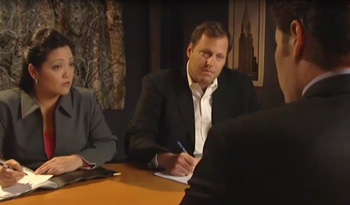A position opens up in your company and you’re part of the interview process. This will be a brand new experience for some interviewers and a repeat performance for others. Regardless, hiring the right candidate is an anxiety-inducing process for all parties, with much at stake.
There’s a simple technique to help you avoid the “Jitters” when conducting pre-interview telephone screenings, face-to-face interviews, and appraisals, as well.
It’s called “The Power of You.” Here’s how it works.
Many candidates in an interview or appraisal will be pleased to tell you about their previous experience and success, describing these things by saying “we did this” and “we did that.” What you actually are interested to know is “what did you do?”
 You need a technique to help you cut through the statements of success made on behalf of the team so you’re able to evaluate the contribution of the person in front of you. Learning to use “The Power of You” will help you do that.
You need a technique to help you cut through the statements of success made on behalf of the team so you’re able to evaluate the contribution of the person in front of you. Learning to use “The Power of You” will help you do that.
Let’s listen in on an interviewer using the technique.
Interviewer: Jason, what would you say was your biggest achievement in your current position?
Jason: Hmm, I’d have to say the creation of a project database.
Interviewer: Interesting! Tell me about that.
Jason: Well, we created a database to hold historical information on all prior projects to use when quoting future proposals. We achieved 90% more on-time success!
Interviewer: That is very impressive! Now, tell me: How did you, personally, contribute to making this project happen?
Jason: I was part of that team.
Interviewer: Right, but specifically, what did you do as a part of this team?
Jason: Well, I recorded all the suggestions and documented the work done by those in our group.
Ah hah! By drilling down and using “The Power of You” this interviewer was able to determine that the candidate was not personally responsible for designing or building the database, and, in fact, played a minor role in the project. This interviewer just might have uncovered a critical issue about this candidate’s suitability for the position.
“The Power of You” technique is especially effective when the interviewer has a very clear idea about what to look for in a candidate. First determine the requirements and then use the technique to ask the questions to reveal whether or not this candidate meets them. Remember that as an interviewer you want to know not only what the candidate did, but specifically what the candidate did that was relevant to the successful project.
Let’s look at another scenario that is a common stumbling block for an interviewer, and where “The Power of You” technique can keep you on firm footing. It occurs when the interviewer asks the candidate about an important ability for the position, and the candidate responds with an agreeable opinion about its importance. It’s a stumbling block because the response sounds good, on the surface, but it doesn’t really tell the interviewer if the candidate possesses—and uses—the ability on the job. Let’s see how Jason fares in this example.
Interviewer: So, Jason, I want someone for this position who shows a lot of initiative.
Jason: Yes, I agree it is so important to take initiative on the job!
Interviewer: What would be an example where you took initiative in your current role and made an important difference?
Jason: We were able to procure a high-speed printer to get more work out the door each day.
Interviewer: Okay, and by “we,” I assume you mean this was a team effort of some kind? Tell me, what was your role in that?
Jason: I put together the cost/benefit analysis, researched industry comps and made the successful case to management for acquiring the printer.
Now we’re getting somewhere! Jason just told the interviewer some very significant things about himself, including about his business acumen, his powers of persuasion, as well as where he took initiative for a successful business outcome. This interviewer found out how the candidate actually behaves in practice, and that is “The Power of You.”
Review:
- Decide what behaviors you need for people in a particular role.
- Then ask questions using “The Power of You” to find out exactly what the candidate actually does.
- Don’t accept “we.” Always bring it back to “you.” Yes, but what did YOU do?
- Don’t accept generalizations. (Drill down!)
- Spend less time interviewing for replacement people and more time developing the good staff you already have.
##########
© ServiceSkills.com We encourage you to distribute this message to colleagues. When you’re ready to empower your staff with proven customer service and team building skills, please let us know.
